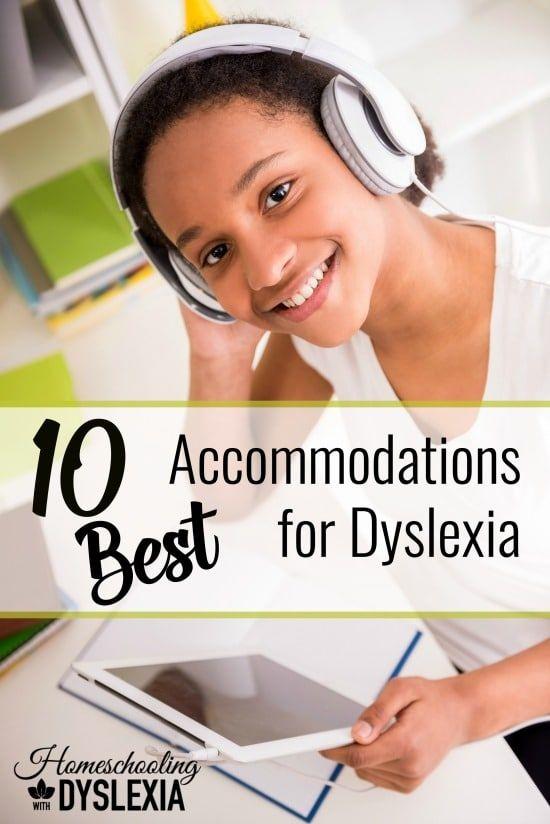In yesterday’s post on Understanding Accommodations and Remediation in the Homeschool, we defined accommodations and looked at why they are so important. As promised, today we will look at the best accommodations for students with dyslexia in the homeschool as well as how to balance them with remediation as your kids grow.

Best Accommodations for the Homeschool Student With Dyslexia
1. Read materials to student. One of the most frustrating situations for parents homeschooling their dyslexic kids is the lack of ability to read assignments. This is especially so when the child is totally capable of understanding the material. Most parents spend quite a bit of time reading to their dyslexic kids. Every parent of a child with dyslexia should have a few good resources for audio books. It also can be helpful to find curricula with audio resources. For some of our top picks, visit our Resources Page.
2. Allow oral responses instead of written. Difficulty with handwriting (called dysgraphia) and spelling can make written assignments more of a lesson in futility than anything else. Step back and remember the big picture – we want them to learn to organize and express their thoughts on a particular subject. Writing and spelling instruction will fall under remediation for a time until fluency develops. Until then, there is no need to make every subject a reading and writing lesson as well.
3. Allowing extra time on assignments. This simple accommodation is one of the most effective for leveling the playing field for dyslexic students. Slower reading and processing times makes timed tests or assignments difficult. Give your student the freedom to succeed by giving them the time they need to do their best work.
4. Allow instructional aids like a number strips or alphabet chart. This type of simple accommodation often leads to remediation over time. A student who refers to their chart to find the needed information in context, will often begin to remember without the chart after a short time.
5. Allow the use of assistive technology. This can be anything from low tech stuff like highlighters, enlarging print, using a spellchecker, or running a 3×5 card under text to more high tech stuff like speech-to-text or text-to-speech apps, organizational apps, or word predicting software.
Click here for a list of the best Assistive Technology for students with dyslexia.
6. Keep instructional times short (10-15 minutes) and provide a variety of ways for kids to practice what they have learned.
7. Provide one step directions at a time. Dyslexia often involves delays in processing information. Students with dyslexia have trouble processing, prioritizing and remembering long lists of directions at one time.
8. Preview and review. Introduce each concept before instruction and review afterwards. This helps with memory and organization of thoughts. Dyslexic kids learn through meaning. Meaning provides a framework for remembering. Rote memory does not work well for these students. Focus on concepts and real-life examples and experiences.
9. Give a clear sense of how much time they will be working on a task. Limiting the amount of time a student is required to work on a subject (at one time or sitting) especially difficult tasks like reading – helps them to maintain focus and motivation.
10. Course substitutions. Learning a foreign language can be extremely difficult for a student with dyslexia. Most high schools and more and more colleges are now waiving this requirement by exchanging it for a cultural courses or art course.
Are Dyslexia Accommodations Unfair?
Some people, especially those who don’t understand dyslexia, complain that it is unfair to allow dyslexic students accommodation. What accommodations are doing, however, is leveling the playing field so to speak. They are allowing kids to work to their full intellectual ability that without accommodation would not be possible.
What you’re trying to do is convey knowledge to these kids; it’s not about trying to trick them out of success. – Charles Schwab (dyslexic) on accommodations
Balancing Accommodation With Remediation
It is important for teachers and parents who are homeschooling to find the right balance between remediation and accommodation. All kids need to build a solid academic foundation. Since this oftentimes takes longer for the dyslexic student, providing accommodations can help these students to work at their intellectual ability with more and more independence while remediation is still taking place.







Hello, I would love further information on dyslexia accommodations, and ways to help my child. He is 18yrs old and has been in the special education program since age three. He was diagnosed with a five yr developmental delay and later a language impairment that mimics dyslexia. So where he has received some help in school…it has not been for dyslexia..which he so desperately needed. He will graduate this May…with hopes of going to a junior college for photography.
Thankyou, Mrs. Dana Metz
Hi Dana,
Here is an entire series that I wrote on preparing for college with dyslexia:https://dev.homeschoolingwithdyslexia.com/dyslexia-college/
There is a post on how to get accommodations in college. In my experience, the junior colleges are very good at helping kids with learning issues.
Make sure to save your documentation as it will follow your child through post secondary training and education. One student was able to use her high school IEP to have the state’s cosmetology test read to her. Another accommodation could have been a tape recording of the test where she could rewind and listen as often as she needed to process the information. Job skills might be influenced by gaining access to use adaptive equipment such as a talking measuring tape for construction, spell and grammar check for law enforcement reports, and many other ideastools that help one be as successful as possible. Best of luck!!
Hi, I’m a mom of a 11 year old boy with autism and we struggle with dyslexia.
I would like to know more about strategies to help him improve his reading.